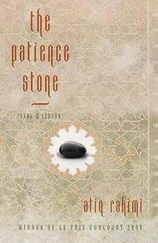“I have. But all he can think about is the disappearance of his adopted son. People are saying he’s been murdered, beheaded…”
“The dance of the dead !”
They fall silent. As they leave the building, Rassoul stops the clerk. “You are the only person who can help me. You know so much. You must have dealt with so many cases, heard so many stories…”
“Yes, I have! But never one like this! In your case, there is nothing I can do.”
“But there is: you can help me find Nana Alia’s body.”
“Why are you so interested in her damned corpse?”
“Because it will prove that I killed.”
“There’s no need to prove that. Everyone knows you killed. If you’re so keen to trail a corpse around the streets, you’d better get moving! Just this morning three beheaded and decaying bodies were found hidden in a tomb at the Dehafghanan cemetery. Go and tell them you’re the murderer!”
Rassoul says nothing.
When they reach the Wellayat courtyard, one of Qhazi sahib’s guards is waiting. He sees Rassoul and calls out: “What are you doing here?”
“Commandant Parwaiz spoke to Qhazi sahib yesterday; it’s OK, everything is settled,” replies the clerk, before saying to Rassoul, “We’ll discuss your request another time. Now get out of here!”
“Yes, but… I don’t know where to go.”
“Go home, young man!”
The guard interrupts: “No, wait! He is a prisoner here.”
“Not anymore.”
“What do you mean, not anymore? The judge is looking for him. How could he have been released without the judge’s permission?” He prods Rassoul with his gun. “Come on now, move!”
Stunned, the clerk walks up to Rassoul and mutters quietly: “You must be completely nuts! Your head smells of qhorma! The world would be better off if you’d stayed mute.”
“I did go home, but everything refused to recognize me, it was all slipping away from me, my books, my bed, my clothes… It was all rejecting me. I went to my fiancée’s house. She no longer recognizes me, either…”
“Don’t worry! Everyone here recognizes you,” says the guard, who is now holding Rassoul firmly by the arm. He drags him over to Qhazi sahib’s office. Their hasty arrival startles a pigeon that had been pecking about on the judge’s desk. It flies around the room in a panic, bashing against the windows and then flapping toward the door. “Shut the door, quick!” the Qhazi shouts. Pointing at the pigeon: “The exhibit must not be allowed to escape!” The guard rushes to shut the door. At last the judge notices Rassoul and in a fury asks the guard and the clerk: “Where had he gone?”
“He had left his cell, Qhazi sahib!” says the guard. This makes the Qhazi even more enraged. “What do you mean, left his cell? Who gave him permission?” The clerk mumbles: “Commandant Parwaiz summoned him, he…”
“Who is the Qhazi here? Him or me? Get this man out of here! Take him back to his cell! Chain him up!”
The two men sitting in front of the judge’s desk turn toward Rassoul. One is the caretaker of the Shah-e do Shamshira Wali mausoleum; the other is the old man who was feeding wheat to the pigeons. Both are startled to see Rassoul. The old man rushes over: “No, Qhazi sahib, no, this young man is my witness. He was at the mausoleum, he saw me…” The judge, surprised, gestures to the guard to keep hold of Rassoul; then, pointing to the old man now standing next to Rassoul, says to the clerk: “First, create a file for this man.”
“What is the crime?”
“Theft of pigeons from the mausoleum,” replies the judge, and the caretaker concurs: “He came to feed them every day, with wheat,” he turns toward the judge, “with wheat, that is!” then toward the clerk, “giving wheat is a sin. After that, he stole the pigeons. Do you know why?” He turns toward the judge again, “to grill them and eat them. His neighbors told me. They told me they could smell meat cooking at his place every day…”
“I have never eaten grilled pigeons. Lahawlobellah! The Shah-e do Shamshira Wali mausoleum pigeons? Lahawlobellah! He is lying!” cries the old man, rushing up to the caretaker. “Do you know that slander is one of the greatest sins?”
“So what was that pigeon doing in your pocket?” asks the caretaker, before saying to the Qhazi: “I found it in his pocket myself.” The pigeon flies around the room. The old man walks up to the judge, in great distress: “It was pecking in my pocket. The mausoleum pigeons trust me, they like me. Look!” He whistles, and the pigeon flies over to him and lands on his shoulder. “He trusts me.” He implores the caretaker: “Do not lie, my brother! You, the guardian of the Shah-e do Shamshira Wali mausoleum, are you not ashamed, before Qhazi sahib and before God, of wrongly accusing a Muslim brother?” To Rassoul, he begs: “You saw me, the other day. Tell them what I was doing there…”
“This young man is mixed up in the story as well?” asks the Qhazi. Rassoul takes a step forward to say: “I only saw him once, two or three days ago. My fiancée and I had gone there to pray. And I…”
“Qhazi sahib, you are right,” interrupts the caretaker. “They are in it together. This man arrived to steal the alms money. He had a gun, and wanted to kill me as well…”
“Why are you lying?” cries Rassoul, taking another step forward. The guard grabs him. “Yes, I went there to kill him, but not to steal. Just to avenge myself, but in the end I couldn’t…”
“You get everywhere! Who are you, what are you?” demands the Qhazi, leaning over his desk.
“Qhazi sahib, allow me to tell you,” interrupts the caretaker again, standing up. “He’s a… forgive me, Qhazi sahib—may Allah fill my mouth with dust!—this man is a pimp. Yes, he came to the mausoleum yesterday, with a… forgive me, Qhazi sahib—may Allah fill my mouth with dust!—with a whore. I chased her out; and he, he wanted to steal the mausoleum’s money. They didn’t come to pray, they came to steal!” The pigeon flies in front of him. The judge shouts at Rassoul: “With an impure woman? Fitna! You know it was because of an impure woman that the holy man Shah-e do Shamshira Wali, whose sacred tomb lies in that mausoleum, lost his life.” He turns toward the others: “They say that even after he was beheaded by the enemy, the holy man continued to fight valiantly, a sword in each hand. When he reached Kabul, an impure woman cast him the evil eye and he collapsed and gave up his soul. In the Hadiths, it is said: ‘Never let an impure woman enter a sacred place.’ And this man, he took an impure woman to this sacred place! Where the other one was stealing pigeons! What kind of Muslims are you?” He shouts at the clerk: “Write! Write that the punishment reserved for thieves shall be meted out to him,” he points at the old man, “who is accused of the theft of pigeons from within the sacred mausoleum. May both his hands be cut off.” The old man opens his mouth, horrified, unable to speak. The pigeon leaves his shoulder, flutters around the room and lands on the Qhazi’s desk. The clerk walks up to the judge and whispers in his ear: “Qhazi sahib, may I venture to remind you that according to sharia law, the amputation of an individual who has stolen something that has no owner, from a public place, is not considered a valid punishment.”
“For what reason?”
“Qhazi sahib, we asked Imam Ali if the penalty of amputation was applicable to the theft of animals belonging to nobody, from a public place, and the holy man replied in the negative.”
“Are you trying to give me a lesson in sharia?”
“ Astaghfirullah ! It was just a reminder, most venerable Qhazi sahib.”
Читать дальше












